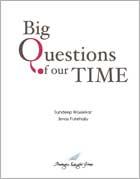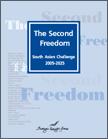Will Pakistan Survive?
 |
South Asia
Global Foresight
Terrorism
Big Questions of our time
Future
Democracy and Development
Islam - West Relations
Extremism and Terrorism
November 2007
By Sundeep Waslekar
|
The decision by General Musharrf to force the Martial Law on Pakistan poses two serious questions. Is it the beginning of the end of the Musharraf regime? Or is it the beginning of the end of Pakistan? These two questions offer stark alternatives. If General Musharraf survives in power, he will dissolve Pakistan. If, on the other hand, he is removed from the scene, there is a good prospect for Pakistan to rejuvenate itself as a nation. The choice is crystal clear �€“either the axis between the military and extremists will survive or the Pakistani nation will survive. It will not be possible for the two to co-exist for more than a few years.
The track record of Pakistan�€™s military rulers has been dangerous from the perspective of the territorial and psychological unity of the country. The first military rule of General Yahya Khan concluded with bifurcation of the country and the birth of Bangladesh. The second military rule of General Zia ul Haq carved a huge hole in the heart of Pakistan�€™s institutions and filled it with a large scale infusion of religious extremism. The Pakistanis also believe that they lost the Siachin glaciers to India. The rule of General Musharraf may result in the loss of Pakistan itself. He has systematically destroyed political parties. His latest move is aimed at destroying the judiciary, media and civil society. The army, Pakistan�€™s last institution, is under attack from forces produced by General Zia and General Musharraf. It is now commonplace for the militant offspring of the Zia-Musharraf policy framework to kidnap or kill Pakistan�€™s soldiers. No wonder then that every now and then columnists in Pakistan�€™s Urdu newspapers and speakers in street rallies compare the present situation to 1971 �€“ the year Pakistan won the honour of being the first major post-colonial state to be divided by its own army.
General Musharraf came to power in a coup in 1999 after establishing a track record as an incompetent military commander. He tried to invade India in the Kargil sector and was miserably defeated. Soon after his ascent to power, Jaish-e-Mohammed, a new terrorist organisation came into existence in Pakistan, which established itself in a few months time. Jaish-e-Mohammed is known for recruitment in government schools, not religious madrassas. It was under the Musharraf regime that for the first time in Pakistan�€™s history representatives of theocratic ideals were elected to the national legislature in a large number. How it happened is well known to those familiar with the activities of Pakistan�€™s intelligence agencies. It was later on under the Musharraf regime that Taliban, who had been stripped of power in Kabul in 2001, regained foothold and have not only shown the courage to demand a rule over half of Afghanistan but have already taken over parts of Pakistan. It was under General Musharraf�€™s rule that Sipah-e-Sahiba and Lashker-e-Taiba have gained strength. In brief, the Musharraf regime is synonymous with the growth of religious extremism posing a threat to international security. (Jaish operatives were suspected to be behind the plot unearthed in London to blow up planes.) There is no doubt that General Musharraf helped the United States to nab almost a 1000 members of Al Qaeda. At the same time, he has enabled the growth of much larger extremist organisations, not to mention the A Q Khan network for smuggling nuclear technology and material. If he continues to wield unchecked power, extremist organisations will grow in strength to create a large hydra-headed monster. Ordinarily General Musharraf�€™s future would be a question for one country. However, since he is the patron in chief of a conglomerate of extremist organisations, his future poses a big question for safety and security of the entire international community.
In the first few months after the coup in 1999, the General had raised hopes from a population that was fed up with Benazir Bhutto who first created Taliban, before handing it over to the military, and Nawaz Sharief, who was accused of corruption. However, he soon lost his popularity not only among people but also among the ranks of the military. He has primarily been in power with the help of the United States. He will continue to rule Pakistan until his supporters in Washington DC value his services. Once they have used him, he may wander from country to country looking for asylum like the Shah of Iran or disappear in thin air like General Zia. If he gets high marks in the evaluation of his services, he may even end up as a Senior Fellow at a prestigious American think-tank. In the meanwhile, he will finish whatever remains of Pakistan�€™s institutions, unless the people of Pakistan show extraordinary courage to end his rule and for once take the future of the country in their own hands.
The question before the people of Pakistan is not merely about who should rule them. The question is about the existence of the institutions of state and survival of the nation in a cohesive form. There is a bigger question for the world. How should the world deal with dictators who usurp power? It applies to Pakistan, Bangladesh, Burma, Thailand, and a long list of other countries. The world needs to evolve a consensus on banning military aid and trade, freezing bank accounts and withholding Visas for families and associates of those who have used guns to steal power. Otherwise all the talk about commitment to democracy is nothing but deceit and hypocrisy.
Related Publications
-
.jpg&maxw=50)
Big Questions of Our time: The World Speaks, 2016
Download:Big Questions of Our time: The World Speaks _Full Report
-

-

Second Freedom South Asian Challenge 2005-2025, 2005
read more
Download:Second Freedom South Asian Challenge 2005-2025 Full Report
Related latest News
Related Conferences Reports
-

Global Challenges Conference, October 2016
Download:Global Challenges Conference Report
-

Conference on Responsibility to the Future: Business, Peace and Sustainability, June, 2008
Download:Global Security and Economy: Emerging Issues


